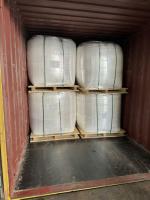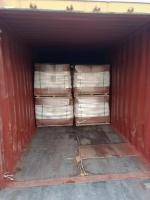Our Products
Polyacrylamide / Zetag 7873 equivalent cationic polyacrylamide emulsion can be replaced by Chinafloc Em3012

Cationic polyacrylamides (CPAMs) are among the most widely used polymers in modern water and wastewater treatment processes. Their role as flocculants, coagulant aids, and sludge conditioners makes them indispensable for both municipal and industrial operations where solid–liquid separation is essential. One commercial product in this family is Zetag 7873, which is supplied as a cationic polyacrylamide emulsion. The emulsion form allows easier handling, rapid dissolution in water, and consistent performance compared to dry powders. Zetag 7873 is designed with optimized cationic charge density and molecular weight to target negatively charged suspended solids, colloids, and organic matter. By binding these particles and forming strong flocs, it improves sedimentation, filtration, and dewatering processes. The following sections provide a comprehensive overview of the applications of Zetag 7873 across different industries, with emphasis on its technical and environmental benefits.
One of the foremost applications of Zetag 7873 is in municipal wastewater treatment plants. Domestic sewage typically contains organic matter, food residues, soaps, greases, and microorganisms that contribute to turbidity and high biochemical oxygen demand (BOD). Since most suspended solids in wastewater are negatively charged, they are difficult to settle naturally. Zetag 7873, being cationic, neutralizes these charges and bridges particles together to form larger flocs. These flocs settle faster in primary and secondary clarifiers, reducing turbidity and suspended solids in the treated water. The polymer is also used in tertiary treatment as a polishing aid, ensuring that effluent discharged to natural waters meets regulatory standards. By enabling rapid and efficient clarification, Zetag 7873 improves plant throughput and reduces overall treatment costs.
A second critical application is sludge thickening and dewatering. Wastewater treatment inevitably produces sludge, which contains high levels of water and is expensive to transport or dispose of. Without treatment, sludge may be up to 98–99% water. When Zetag 7873 is applied prior to mechanical dewatering equipment such as belt presses, centrifuges, or chamber filter presses, it conditions the sludge by increasing floc size and strength. This allows water to be released more readily, producing a drier cake with higher solids content. The benefits are multiple: reduced sludge volume, lower disposal and transport costs, less odor, and improved energy efficiency. Sludge treated with Zetag 7873 is easier to handle and may be more suitable for subsequent uses such as composting, land application, or incineration.
In industrial wastewater treatment, Zetag 7873 has a wide range of applications. In the food and beverage industry, effluents are rich in fats, proteins, sugars, and suspended organics. These effluents can be clarified more effectively when Zetag 7873 is used, ensuring compliance with stringent discharge standards. In the textile industry, wastewater often contains dyes, fibers, and high chemical oxygen demand (COD). The cationic polymer binds with negatively charged dye molecules, reducing color and turbidity while making subsequent treatment steps more efficient. In the pulp and paper industry, Zetag 7873 aids in fiber recovery, improves white water clarification, and assists in handling secondary sludge, reducing fiber losses and improving environmental performance. In chemical manufacturing and petrochemical sectors, it helps in treating effluents with emulsified oils, colloids, and fine solids, ensuring cleaner discharges and reduced environmental impact.
Zetag 7873 also plays a role in drinking water treatment, where water from rivers, lakes, or reservoirs often contains fine suspended solids, clays, and organic matter that resist simple sedimentation. Although primary coagulants such as alum or ferric chloride are commonly used, the addition of Zetag 7873 as a coagulant aid accelerates floc growth, shortens settling times, and produces clearer filtrate. This leads to improved filter performance, lower chemical usage, and higher-quality treated water. However, only certified food-grade versions are used for potable water applications, ensuring full compliance with safety regulations.
In mineral processing and mining operations, Zetag 7873 provides significant benefits for tailings management and water recovery. During ore beneficiation, large volumes of slurry are produced containing fine mineral particles that are slow to settle. By applying Zetag 7873, operators achieve more efficient thickening, clearer overflow water, and faster settling of tailings. This enables greater water recycling, reduces the size and environmental impact of tailings ponds, and improves resource efficiency. In coal washing facilities, it assists in separating fine coal particles from wastewater, increasing coal recovery and reducing water losses.
Another growing application area is in biogas plants and anaerobic digestion facilities, where organic sludge from municipal or industrial sources is digested to produce renewable energy. The residual digestate still requires dewatering before disposal or land application. Zetag 7873 improves dewatering efficiency, resulting in digestate with higher dry solids, which reduces handling and storage costs. This makes the overall energy recovery process more economical and sustainable.
Zetag 7873 also contributes to environmental sustainability and resource management. By improving dewatering and thickening, it reduces the overall sludge volume, lowering disposal demands on landfills or incinerators. By enhancing clarification, it enables more water to be recycled and reused within industrial processes, which reduces freshwater consumption. The reduced use of inorganic salts, when Zetag 7873 is employed as a coagulant aid, minimizes sludge generation and decreases the overall environmental footprint of water treatment facilities.
An additional advantage of Zetag 7873 lies in its emulsion formulation. Unlike dry powders that require long hydration times, the emulsion form disperses quickly in water, delivering rapid results in treatment systems. This allows for more efficient plant operations, simplified dosing systems, and consistent treatment performance. For facilities requiring continuous dosing under varying load conditions, Zetag 7873 provides flexibility and stability that improve operational reliability.
In summary, Zetag 7873 cationic polyacrylamide emulsion is a versatile and effective polymer solution designed for a wide range of solid–liquid separation processes. Its primary applications include municipal wastewater treatment, sludge thickening and dewatering, industrial effluent clarification, potable water treatment, mining and mineral processing, and biogas operations. The product’s strong cationic nature allows it to neutralize negatively charged particles, forming robust flocs that settle or filter efficiently. By doing so, Zetag 7873 enhances water quality, reduces sludge volumes, improves treatment economics, and supports environmental sustainability. Its emulsion form ensures ease of use and rapid action, making it a preferred choice for many operators seeking reliable and efficient water treatment solutions. As regulatory pressures and sustainability goals intensify worldwide, products like Zetag 7873 will continue to play a pivotal role in meeting the dual challenges of clean water provision and responsible waste management.





263_small.jpg)